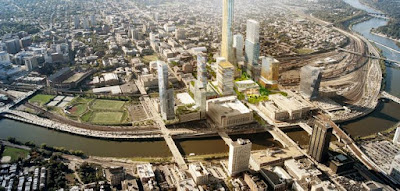Philadelphia is preparing an incentive package for Amazon, in hopes of attracting the corporation to establish its second headquarters in the city. This week, legislation is advancing to help sweeten the offer.
On Tuesday, City Council’s Finance Committee gave a favorable vote to a bill that would renew twelve Keystone Opportunity Zone (KOZ) designations for properties in University City. The bill also gives approval for the city to seek seven additional KOZ designations in the same area, many of which were unsuccessfully submitted for consideration last year. The Wolf administration, however, put a freeze on tax break programs during the budget standoff, so the city’s submissions last year were rejected.
The Councilmembers uniformly embraced the legislation, presented by representatives of the Commerce Department, voting it out of committee unanimously.
“Resubmitting these properties makes it [Philadelphia] attractable, as we are supposed to do in the business-friendly way for the creation of jobs,” said Councilman Bobby Henon, vice-chair of the Finance Committee, in remarks praising the Commerce Department.
The Keystone Opportunity Zone program was established in 1999 to incentivize growth in struggling areas of Pennsylvania. To get a parcel of land designated as a KOZ, it must be considered vacant or underutilized. That parcel is then exempt from a variety of state and local taxes for a period of ten years after work begins on the site.
On the local level, such parcels are exempted from real estate taxes, the use and occupancy tax, the sales and use tax, and the business income and receipts tax. At the state level, relief would be granted from the sale and use tax, and the corporate income tax. Neither Philadelphia’s wage tax nor the state income tax are exempted under a KOZ.
The twelve sites that already designated for potential KOZ status largely overlap with the Schuylkill Yards project and the Market Street spine of University City’s office district. The seven new sites that the city wants to give KOZ status would address a few spots on the map where such tax breaks are not already available.
“These new KOZ applications would fill the hole in the donut for University City,” said Sylvie Howard, the Commerce Department’s chief of staff. “All of the [older] KOZs we are extending haven’t been utilized yet, no one has benefited from them. If we extend them, the 10-year window would be triggered when tenants are found.”
Proponents say that KOZs have induced $1.7 billion in new private investment, with 12,000 jobs created or retained, all in Philadelphia alone. But critics have argued that the benefits of the program are difficult to measure and that the cost to taxpayers per job is far too high. One expert told PlanPhilly last year that 70 percent of the recipients were already paying taxes in the city before winning KOZ designation, meaning it was hardly attracting new companies.
That last critique, at least, cannot be applied to a potential Amazon headquarters location in Philadelphia.
The city has also tried to appease critics who say the tax breaks rob schools of needed tax revenues. These days all property owners who make use of a KOZ designation have to enter into a Payment In Lieu Of Taxes (PILOT) agreement with the city for 110 percent of the existing real estate tax assessment prior to development . 55 percent of these revenues go to the School District of Philadelphia and 45 percent go to the city’s general fund.
The Commerce Department’s Duane Bumb emphasized that some of the properties being renewed as potential KOZs include those that were inducted into the program before the PILOT requirement. As such, they would not be required to make payments under their current KOZ agreements, but will be required to pay PILOTs if Council extends the designation.
Some councilmembers wondered if the Wolf administration would be more likely to accepted Philadelphia’s KOZ applications this time around. Baum said that they only needed the governor’s approval of the seven new sites and that the administration believes it can extend the existing KOZ terms on its own for the properties that already enjoy the designation.
Although no councilmembers opposed the legislation, throughout the hearing they shadow-boxed with imagined opponents. Councilwoman at-large Blondell Reynolds Brown said that while councilmembers understand the benefit of KOZs, the Commerce Department representatives should explain it to community members who may feel more skeptically.
“These sites are currently paying very little, because they are vacant, except where they are held by non-profits. [Then] they don’t pay at all,” said Bumb. “The program provides job opportunities…and generates significant wage taxes in the city so the economic impact of that is enormous.”
Howard said that if Amazon’s bid were secured, the city could expect 8 million square feet of new office space. That’s would increase Philadelphia’s total office stock by about 20 percent.
“We believe this is a game changer,” said Howard. “While right now we really need that wage tax money this could provide us with an opportunity to make positive changes to make the environment more business friendly for everyone.”
After the hearing, Howard told PlanPhilly that many of the city would have attempted to extend KOZs on many of these sites even without the Amazon bid. But the bill is being introduced now, instead of in the spring, to ensure that Amazon takes note.
On Thursday the bill will be reported out of committee. It is likely to be passed next Thursday.
Source: Plan Philly

No comments:
Post a Comment